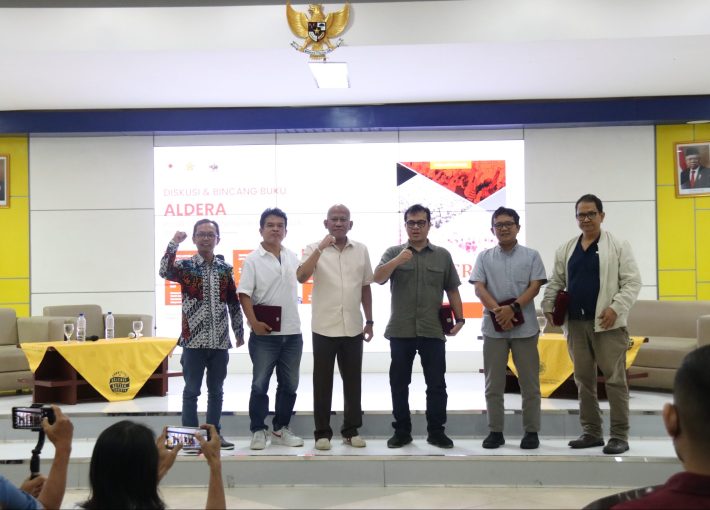
Yogyakarta, November 18th 2022—FISIPOL in collaboration with the Center for Pancasila Studies (PSP) of UGM has held a discussion and review of the book with the theme “ALDERA Portrait of the Youth Political Movement 1993-1998”. This activity was held in the Auditorium room of FISIPOL UGM and broadcast live via the Tribun Jogja Official Youtube channel. The discussion was attended by speakers who were ALDERA figures of their time, namely Nezar Patria, M.Sc., M.B.A., (Secretary General of SMID 1995-1998), Teddy Wibisana (Author of Aldera Books & Bogor Activists), Dr. Arie Sujito, S.Soc., M.Sc., (Deputy Chancellor for Student Affairs, Community Service, and Alumni of UGM) moderated by the initiator of the student oath, namely Afnan Malay, and presented a keynote speaker from BPK RI members, Dr. Pius Lustrilanang, S.IP., M.Si, CFrA, CSFA.
ALDERA is an acronym for the People’s Democratic Alliance which played an important role in the interaction of resistance to the New Order regime. Quoted in the book “ALDERA’s Portrait of the Youth Political Movement 1993-1998”. ALDERA is history and the spirit of young people who pushed for reform in 1998. Until now, ALDERA has been sufficient as a people’s political movement and has not turned into a political party. Although previous ALDERA activists have now become an important part of Indonesia’s political dynamics.
“his discussion on ALDERA’s book review aims to inspire the younger generation to be able to build a more advanced and dignified Indonesia through the fighting spirit of the former student movement,” said Diasma Sandi Swandaru from the Representative Head of the Center for Pancasila Studies of UGM in her remarks.
ALDERA became a bold action against the regime of the authorities at that time. Nezar Patria who contributed to writing the foreword to the book ALDERA also said, “ALDERA teaches us about one commitment, namely populist politics.”
Furthermore, Nezar explained that after the reform, capitalist political parties began to aggressively target students so that a floating democracy occurred. As a result, NGOs began to lose their young successors and only a few NGOs survived in the political sphere. However, today’s youth movements are more diverse, for example, climate change concerns, inequality, and equality, which take longer to complete because they are related to the global capitalist ecosystem and so on.
“In the course of the student movement or in any history that presents young people, it is important to write about it and then reflect on it and hold a dialogue,” said Arie. The lesson from the ALDERA movement is that it is important to generate creative ideas without losing historical value.
